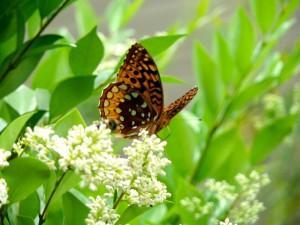
A couple weeks ago, I had the opportunity to sit on a porch in southern Maryland and watch butterflies flutter around a lilac bush. There were at least five different species that day, dozens at a time, flitting from bud to bud.
They were a spectacular sight.
But butterfly watching (substitute a digital camera for the butterfly net and pins and you have a modern version of butterfly catching) might be more short-lived than I thought: the U.S. Fish and Wildlife Service announced last month that two butterflies, both native to Florida, are likely extinct.
If you have been following the drama of the bees, you will know this is not good.
Butterflies, like bees, are important pollinators.
“We look at it as a signal that we’ve got a serious problem with butterflies and other insects and pollinators here in Florida,” Larry Williams, a supervisor for the ecological services program at the Fish and Wildlife Service, told the Washington Post.
In addition, butterflies are barometers of an ecosystem’s health.
“Scientists believe the main cause of decline and disappearance of butterflies in southern Florida is loss, modification and fragmentation, and in some instances inconsistent management, of the natural habitats that butterflies and their larval host plants depend on,” the Fish and Wildlife Service said in a statement. Exotic predatory ants, poaching, pesticides and climate change might also be factors.
If butterflies are going extinct, “it’s a strong indicator that we’re messing up the environment around us,” Robert K. Robbins, a research entomologist at the Smithsonian Institution’s Museum of Natural History, told the Washington Post. (The Smithsonian has an ongoing butterfly display, where hundreds of butterflies from around the world enchant visitors to their hothouse home.)
To be honest, I’m not sure we needed to track the whereabouts of the rockland grass skipper and the Zestos skipper, may their species rest in peace, to know that we’re doing some terrible stuff to the environment. Over the weekend, people in Oregon gathered to pay homage to 50,000 bees killed by pesticide in a Target parking lot.
If we really do manage to kill off all the butterflies, moths, bees and other insects we have been trying so hard to “manage,” the end of butterfly watching will be the least of our worries.
Ironically, I’m in the process of trying to get rid of cabbage worms on the brussel sprouts in my container garden. Despite the name, the little green critters are… you guessed it: caterpillars. Pesticides are off the table, so I’m waiting to see if a chili-garlic-thyme spray will work.
Stay tuned!




